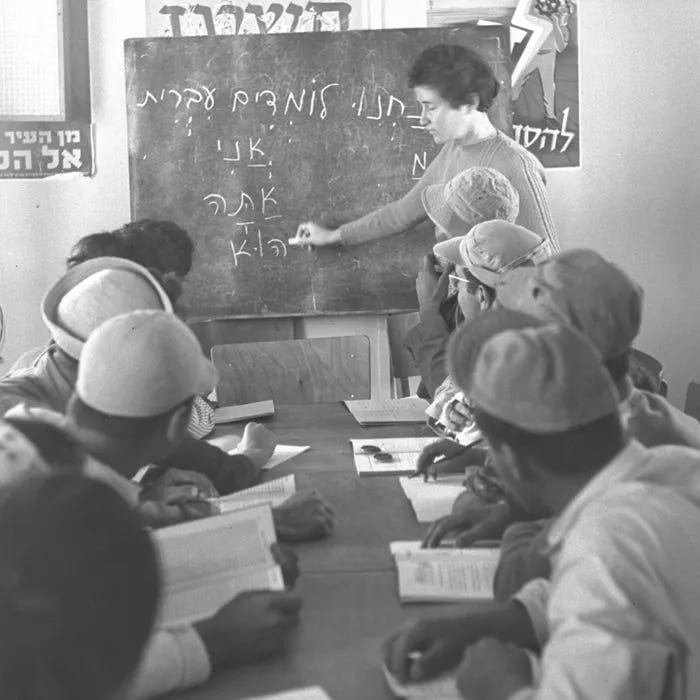When Push Comes to Shove
Not all Israelis are pushy and aggressive. The time has come to push back on the stereotype.
We’re probably all familiar with the stereotype that Israelis are rude, loud, and pushy. You might have experienced this while on a trip to Israel or even while living here. Although you can certainly find Israelis who fit this description, there are quite a few who do not. I might even venture to say that I’ve met plenty of Israelis who are patient, considerate, and dare I say, quiet.
My wife was telling me about an experience she had at an exercise class that she attended with a friend. The teacher had been mean and abrasive. She wasn’t helpful in navigating the class and even condescending. After the class, my wife commented on her teacher’s personality to her friend. To which her friend replied, “That’s just how Israelis are”. It got me thinking about the less than satisfactory PR campaign that has been run on the nature of Israeli culture and how Israelis are perceived by the world, let alone a new olah, or immigrant to Israel. .
After five years of living here, I have discovered quite a different reality. Sure, when tourists experience the shuk and cab drivers, they might think that they’re getting access to a window into how all Israelis behave. That is simply not true, as you will find Israelis of all personality types, even timid and soft-spoken. It might seem strange when encountering this type of person who doesn’t fit the stereotype, but I assure you that they are more common than you think.
“What Israelis call directness and many outsiders consider rude is likely caused by a variety of factors, including the country’s small size, a socialist past that emphasized a radical egalitarianism, a sense of kinship (or perhaps entitlement) among Jews arriving from all over the world and the hard-charging ethos inculcated by Israel’s military culture in the wake of decades of war. (In the army, it is common to call officers by their first names once basic training is over.)”1
Over the course of this post, we’ll dive deeper into some of these factors.
Hebrew As a Direct Language
One reason for this perceived directness and assertiveness comes as a result of the Hebrew language. Hebrew, as compared with English and many other languages, is particularly direct, having far fewer words in its bank.
In place of the indirect, “Pardon me, would it be possible for you to bring water to the table when you have a moment” in English, you might find “efshar mayim?”, or “Can you bring water?”. It’s not necessarily rude to be more concise with language. It’s also more effective. It can all be represented by the word, dugri, which describes a directness, or bottom-line approach. You can think of it in response to, “Give it to me straight”.
It is also much more common to see language expressed more informally in Hebrew. More often than not, someone will address someone who is their senior as achi (my brother) and Israeli schoolchildren address their teachers by their first name. If the norm is to break down barriers from the beginning, it makes sense that personal questions and advice aren’t off the table.
Something that might need adjustment for foreigners or new immigrants is that there are very few topics that are out of bounds for Israelis, such as politics, religion, and salary, which can easily come up in conversation. It might seem abrupt to be asked, “Who did you vote for?”, but it’s quite commonplace in Israel.
As Hebrew is seen as a low-context (direct) language, some aspects of it might surprise new learners of the language. One feature of this is that “negative comments are direct. One assumes the comment is about the issue, not the person”2. Going into interactions knowing not to take things personally can avoid pain. It’s easier said than done, but an awareness of cultural norms is key to understanding.
One Big Happy Family
Another aspect of this directness is the quickened closeness that Israelis might feel to other Israelis and to visitors. You might be direct and abrupt with family members or friends. That might surprise you when a new acquaintance is more familiar than you might expect, but it does have a warm quality to it. Where others might see nosiness, some might see genuine interest in getting to know someone.
Giving unsolicited parenting advice or facing criticism towards a fashion choice can hurt, especially from a stranger. But if you flip the script and hear it from a friend or family member, it doesn’t hurt quite as much. In fact, these tips or critiques often come from a place of caring. An act of caring that contributes to this connection that can be felt in Israel. There is just something different in Israel. It might be our shared peoplehood or traditions that bring us together. We see this bond in the best of times, but even more so in the worst of times.
In the Army
One can venture to say that the military isn’t a place for good manners. When lives are on the line, efficiency and speed are of the utmost importance. Not only is this approach nurtured in the army, but a large majority of the Israeli population has served in the army. Some practices and attitudes that reign supreme during that service do not only surface during those 2 years for women or 3 years for men. They become a part of someone’s way of doing things.

This quality tends to be an asset in the start-up world whose leadership matured in Unit 8200, the elite intelligence unit of the IDF. Being quick to try something and not worrying about feelings along the way have become a part of this culture. Again, this doesn’t apply to all Israelis, as not everyone has served in the army and some naturally have a different personality that leans more towards patience and thoughtfulness.
The Origin of the Sabra
It’s important to remember that not all Israelis fit into this box of rudeness. Qualities that exist around the world also exist in Israel. There may be introverts or people who are more reserved in nature. Regarding rudeness, a large study was conducted by JIMS, or the Journal of Israeli Medical Students, in 2010 that concluded that “in many cases, the results were similar to or even lower than the level of impoliteness reported in the US”3. So at least in this study, the level of impoliteness wasn’t as high as expected.

All of this goes to say that not all Israelis are rude and abrasive. Those who are rude have a reason for it, or even multiple reasons. This shouldn’t excuse rudeness, but it’s not personal or a sign of dysfunction. It is easy to say that someone is a “classic Israeli” or to put Israeli travelers into a box. The best way to avoid this stereotype is to get to know Israelis and embrace the sabra - a metaphor for Israelis, as they have come to be known as rough and pointy on the outside, but sweet and soft on the inside.
This is a cute nickname and the reasoning behind it is sweet, but it doesn't tell the whole story. Since the founding of the State, the Sabra has developed into an icon that is portrayed in literature, film, and theater4.
Dr. Arielle Friedman, head of the Communications department at Oranim College, writes:
“In many films the Sabra is portrayed as a heterosexual Ashkenazi man who is usually handsome and extremely manly, and oftentimes is an IDF combat soldier and lives on a kibbutz. The Sabra symbolizes our attempt to create a figure who is the complete opposite of the weak Jew from the Diaspora, and is the story of our people.”
This image was at its strongest from the 30s through the Six Day War in 1967. It was introduced at a time when Diaspora Jews faced great danger and tragedy. The contrast served to put forth the image of the New Jew, one who is strong and manly. Especially during those three decades, the idea (or even legend) of the Sabra appeared in books, television shows, movies, and music. It embedded itself deep into the Israeli ethos. This was the case until it started to fade.
According to Prof. Motti Neiger of the School of Communication at Bar-Ilan University, the Sabra came to represent only a small portion of the Israel people as the country diversified and its popularity declined
Now the ‘rough on the outside, sweet on the inside’ persona has survived, but the classic Sabra makes only a rare appearance.

For an extensive history of the Sabra legend, click here.
Video Time
A media organization that I’m quite fond of called OpenDor Media has a series called Unpacked for Educators. They created one called “The Truth About Israelis” which goes into more detail about misconceptions of Israelis, including the stereotypes discussed above. It’s quite well done, as you can expect from them, and you might just learn something surprising, such as the fact that Hebrew has 80% fewer words than English.
Song of the Week
אי אפשר לשקר את הלב
Eee ef-shawr l’shaw-care et ha-lev
It’s impossible to lie to the heart
This one comes from the legendary Hadag Nahash and they are joined by Lea Shabat (sister of Shlomi) and the rapper, Peled. It brings together the feelings surrounding dark times with an emotional chorus. You might just find yourself listening to it on repeat.
Slang of the Week
דוגרי
Doo-gree
Straight talk, getting down to the tachlis, or the bottom line
I thank you very much for reading this week’s post. I hope that you’ve enjoyed and that you’ll continue to read them. I would be grateful if you’d share with a friend or family member. It’s a simple message to someone, but it really does have an impact as we grow.
Wishing you a Shabbat shalom and a restful weekend!
Sokol, Sam. “Israelis are blunt and rude. You got a problem with that?”. https://www.timesofisrael.com/israelis-are-blunt-and-rude-you-got-a-problem-with-that/
“Direct vs. indirect communication”. Accultura. https://accultura.com/en/direct-vs-indirect-communications/
Collins, Liat. “Real Israel: no rude awakening”. The Jerusalem Post. https://www.jpost.com/magazine/personal-notes/real-israel-no-rude-awakening
Sapir Weitz, Carmit. “Israel and the metamorphosis of the Sabra through the years”. https://www.jpost.com/israel-news/culture/israel-and-the-metamorphosis-of-the-sabra-through-the-years-667330




